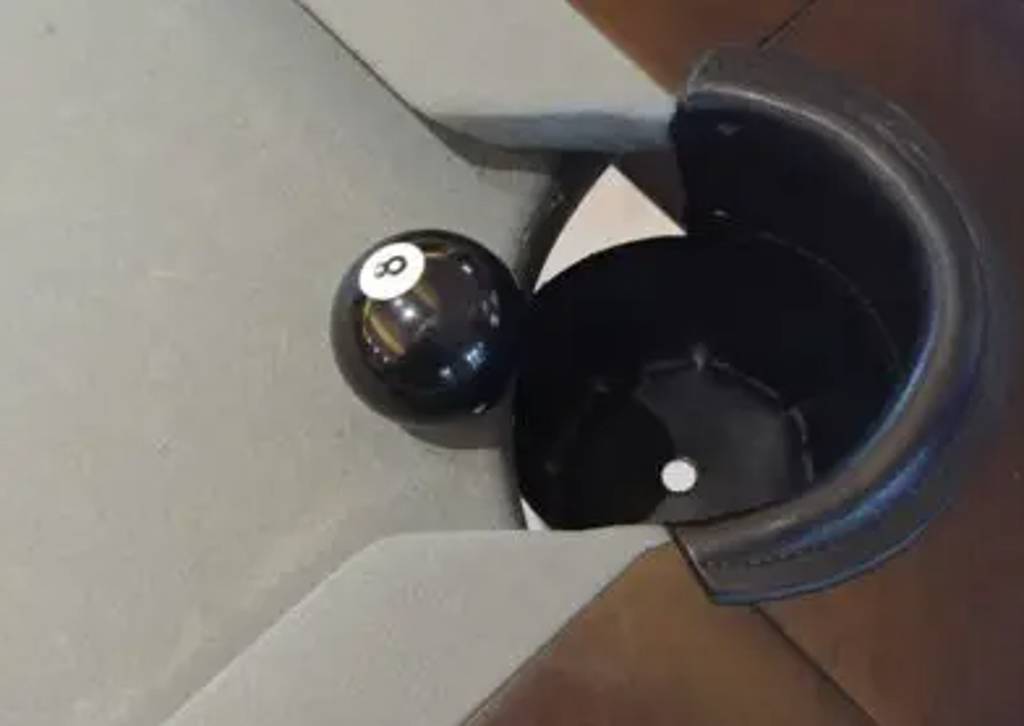I love playing 8-ball but there always seems to be some confusion at the table when it comes to the 8 ball being made on the break. There are various pool leagues with different rules plus your classic ‘Bar Rules’. How confusing!
What is supposed to happen if the 8 ball is pocketed during your break? This mostly depends on which rules you are following. There are APA rules as well as BCA rules, and on top of that the traditional bar rules.
To summarize:
- Bar Rules – You automatically win (if no scratch occurred after breaking)
- APA – You automatically win (if no scratch occurred after breaking)
- BCA – You do not automatically win, the breaker can either request a re-rack or have the 8 ball spotted so they can continue play
As you can see, the most common answer is that you win instantly, with the caveat of the BCA format.
But what happens if you do scratch whilst making the 8-ball on the break? And what are all the nuances between the different formats? We will cover all this and more below.
Bar Rules
Typically, when playing pool at a bar or pool hall and it’s not sanctioned league play, landing the 8 ball during your break will result in an immediate win so long as you don’t scratch at the same time. Some bars and pool halls will have standard 8 ball break rules and most of the time this is the rule that will be followed.
If you do land both the cue ball and the 8 ball, you immediately lose. Usually the other player will ask for a re-rack or you can spot the 8-ball at the head spot and re-play the match. This way you don’t have to re-rack all over. This is optional and up to the opponent.
If you only sink the cue ball, known as scratching, you do not automatically lose. The other player has control of the cue ball for their first shot from behind the 1st string.
APA Rules
According to the APA, if the 8 ball is pocketed on the break, that player wins. However, if they also scratch, then it is an immediate loss. This is very straightforward and is a simple rule to follow. However, the league can also issue penalties for not breaking correctly, resulting in an illegal break.
What exactly is APA?
APA (American Poolplayers Association) is the largest pool league in the world (250k+ members) where players of all skill can be a part of due to their Equalizer handicapping and scoring system.
Other Penalties
They can also serve penalties if your break is soft or safe. This means that you aren’t putting enough power into your break, and you’re doing this on purpose. While you may have sunk the 8 ball without scratching, if you do it with any illegal or disallowed break, you may not be given the win. During league play, this can be devastating.
To ensure your break is legal according to APA league rules, the following is necessary:
- Using as much power as you can while still maintaining control of the shot
- Shooting from behind the head string
- Striking the head ball or second ball
- If a ball is not pocketed on break, at least four of the object balls should reach the rails
If your break is legal and no foul is committed, and you also sink the 8 ball without scratching, APA league rules dictate that you win the match.
BCA Rules
When it comes to BCA league rules, there is a bit of a difference in how an 8 ball break is handled.
What happens if you make the 8 ball on break in BCA?
Unlike Bar rules/APA league rules, pocketing the 8 ball when breaking without scratching does not result in an immediate win. If this occurs, the breaker can do 1 of 2 things:
- Request a re-rack
- 8 ball is spotted & continue play
Most veteran players view this as one of the major rules that separate BCA from the other league formats. This can seem more ‘fair’ to people because making the 8-ball on the break can depend on skill, luck, or both.
What exactly is BCA?
BCA (or BCAPL; Billiard Congress of America Pool League) is a smaller but still very popular league of 50k+ members where the rules align more to the professional pool tournament format. Generally, the average skill of a BCA player is higher than an APA player.
If the breaker pockets the 8 ball and scratches, their opponent can do 1 of 2 things:
- Request a re-rack
- Spot the 8 ball while having the cue ball in hand to play from anywhere behind the head string
These rules can result in what is called an open table. If the breaker pockets the 8 ball and chooses to spot it and continue play, sinking no other object balls, it’s an open table. This means no determination has been made regarding striped or solid balls, or low or high balls, and the player is free to choose on their first shot.
Are there other league formats out there?
There are a lot of other pool leagues that exist today but are much smaller. A few examples are the UPA league or the USAPL league. Check around your local bar or pool hall to see if it’s available near you.
More Info
There’s more to the game of pool when it comes to the 8 ball. Here we cover several aspects of the game directly impacting your play of the 8 ball.
Combination Shots
While pool halls usually have a designated rule when it comes to combination shots, many bars do not. The first rule is you must always hit one of your balls first.
Here is how the other formats describe their Combination Rules:
- According to BCA league rules, combination shots are allowed so long as the first ball hit isn’t the 8 ball
- The APA rules state the same
- If playing by bar rules, be sure to verify with your opponent when it comes to legal combination shots
There are two things that are always constant when consideration combination shots. You can hit any ball when the table is open, and the 8-Ball does not count as a valid ball to strike.
Safety Shot (or Defense)
Safety shots are often allowed in league play according to both the APA and BCA but are not common when playing by bar rules. If you want to allow the safety shot, it’s important to discuss this with your opponent before play begins.
The major difference between BCA and the other two is that BCA allows you to make a shot and call safety. This means you can pocket that 3-ball, and call “safety”, thus giving up the rest of your turn.
APA does not allow this, you can only stop your turn when you have not pocketed a ball.
Bar rules are similar but again, safety shots are generally not played often in Bar games.
Related Questions
You most likely still have questions about the 8 ball break. Here are several related questions we see from those learning more about the game of pool and the role of the 8 ball.
Can I make My Last Ball and the 8-Ball at the Same Time?
No, you must pocket all your balls first before attempting to shoot the 8 ball. This is true in all pool formats.
Where should the 8 ball be when racking?
Typically, during bar rule play, only two of the balls are in mandated positions, the 1 ball and the 8 ball. However, it’s important to always follow the correct rules for racking when playing 8 ball by league rules.
Traditional rules for racking during BCA league play are as follows:
- The one ball should be at the apex, or very front of the rack
- One of the far corners should have a striped ball and the other corner should have a solid
- The 8 ball should be centered in the rack. It should be at the center of the third row back from the apex
- All other balls can be randomly placed in the rack
APA league play only mandates that the 8 ball is in the center of the rack. No other rules are necessary when racking other than to rack the balls as tightly as possible, which is common for all pool rules.
What is the best way to sink the 8 ball on break?
There are many ways to pocket the 8 ball when breaking, including sheer luck. However, this is one of the most common techniques to improve your chances of sinking it.
- Step #1: Play the cue ball from the head string approximately 3 to 4 inches from the rail.
- Step #2: Using an inside spin, aim for the second ball, hitting it just shy of the 1 ball.
- Step #3: Perfect the spin, the angle, and the power needed to pocket the 8 ball when breaking.
How do I know which “8 ball break” rules are being followed?
When playing pool during a sanctioned league event, you will know to follow the rules for that league. Most of the time it will be the American Poolplayers’ Association, known as the APA, or Billiards Congress of America, known as BCA.
When playing at a local bar or during open play at a pool hall, the rules regarding the 8 ball and other things such as called safeties and other shots may not be standardized. You will need to formalize the rules to be followed by your chosen opponent.

